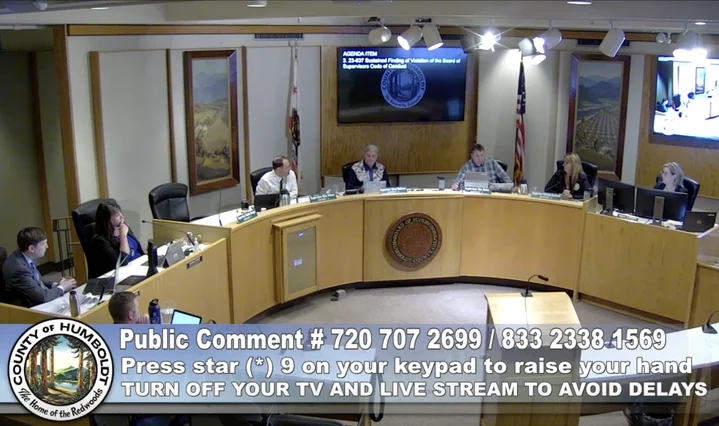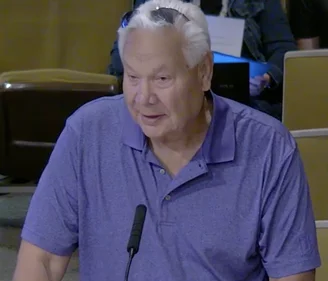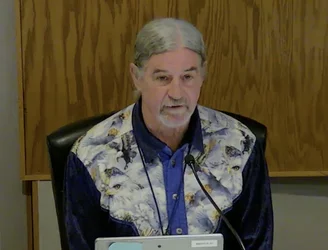Screenshot of Tuesday’s Humboldt County Board of Supervisors meeting.
###
PREVIOUSLY:
###
Tribal leaders with the Trinidad Rancheria appeared during Tuesday’s Humboldt County Board of Supervisors meeting to call for an apology from Fifth District Supervisor and Board Chair Steve Madrone for the “disparaging” and “discriminatory” comments he made during a meeting attended by both Madrone and rancheria representatives last year.
In that meeting, Madrone had drawn false distinctions between the legal status of “rancherias” and “tribes,” for which he later apologized.
A subsequent investigation into the matter determined Madrone’s comments did indeed violate the board’s Code of Conduct, in that the supervisor did not explicitly say that he wasn’t speaking for the whole board, but “there [was] no credible evidence” that his comments constituted as a “verbal attack” against the Tribe.
The board spent over an hour discussing the allegations and exploring ways to improve the county’s relationship with the Trinidad Rancheria, but it all came down to one question: Should the board censure Madrone? Ultimately, the board decided not to.
(“Censure” often gets mixed up with “censor,” but the two words have very different meanings. According to Merriam-Webster, to “censor” means to remove, block, or interfere with the communication of another. To “censure” means to find fault with and criticize as blameworthy.”)
Speaking on behalf of the Tribe during Tuesday’s meeting, Trinidad Rancheria Tribal Chairman Garth Sundberg asked the board to “confirm the rights and status of federally recognized tribes,” adding that “all federally recognized tribes have equal status and standings.”
“As you are aware – and documented by the investigator – Supervisor Madrone’s ongoing words were ill-advised to Trinidad Rancheria and all rancherias in Humboldt County, and we believe they were discriminatory,” Sundberg said. “Also, [Madrone] failed to identify that he was not representing the board in the meeting. We are tired of Madrone discriminating against Trinidad Rancheria, our projects and sending the wrong message based on hearsay and lies.”
Sundberg also requested that the board remove Madrone from the Project Development Team (which is comprised of tribal members, Caltrans staff and other stakeholders) for the Trinidad Rancheria Access Improvement Project.
Reading from a prepared statement, Madrone apologized to the Trinidad Rancheria for any hurt his remarks may have caused. “I recognize and support that all federally recognized Indian tribes – including the Trinidad Rancheria – possess equal rights and status under the federal and state law,” he said.
Madrone admitted that he “did not explicitly state that the individual opinions and positions I offered at the March 29, 2022 meeting did not express the opinion of the entire board,” which a third-party investigation found to be in violation of Section B.9 of the board’s Code of Conduct.
“I recognize that as a board member, I should represent the official policies and positions of the entire Board of Supervisors to the best of my ability,” he continued. “When presenting our own individual opinions and positions, we shall explicitly state they do not represent the opinion of the entire board, and I failed to do that in that meeting. So I apologize for that.”
Speaking during public comment, Trinidad Rancheria Vice-Chair Robert Hemsted asked why it took so long for the board to address the Tribe’s concerns.
“We reached out with a letter [in June of 2022], we didn’t receive a response for an additional six months after we sent an additional email in a second letter [in December],” he said. “I was questioning why that took so long for the Board of Supervisors and the county to decide to respond to a sovereign nation and another government-to-government consultation, or to any questions really.”
Hemsted noted that rancherias “have much broader repercussions throughout the state,” adding that there are still “an estimated 40 rancherias” in California. “A lot of them changed their names through the BIA [Bureau of Indian Affairs] and went to ‘tribe’ because of these misunderstandings and accusations that were made against them, that belittles them and makes them something less than even though the Indian Reorganization Act states that they are equal.”
Trinidad Ranchera Tribal Councilmember Aprilsky Hemsted took issue with the fact that the March 29, 2022 meeting was recorded without the Tribe’s knowledge. She asserted that there is “a common understanding” that participants in a public meeting should be informed when a meeting is recorded.
The recording of the meeting was used as evidence during the third-party investigation into the issue and contributed to the investigator’s finding that Madrone’s comments “were found to be lawful, civil, politely articulated, not directed at a specific person, not a ‘verbal attack,’ and did not constitute ‘unsubstantiated allegations’ as that term is defined,” as stated in the Executive Summary of the investigation.
Jacque Hostler-Carmesin also took issue with the recording and said it “should have been brought forward immediately,” adding that “Caltrans has a policy of not recording” its meetings.
“So why is it that Supervisor Madrone and two people from Westhaven recorded the meeting [and] did not share that with the rest of us?” she asked. “What was the driving factor behind that and why bring it out in the end? You know that that’s not appropriate. It’s disrespectful to the Tribe.”
Hostler-Carmesin asked the board to replace Madrone on the Project Development Team for the Trinidad Rancheria Access Improvement Project due to his previous interactions with the Tribe. She asserted that Madrone “does have a conflict of interest” in the matter because he owns land in Westhaven and has allegedly tried to stymie “all of the developments that the Trinidad Rancheria is doing.”
The investigation did not identify any credible evidence that Madrone’s comments during the aforementioned meeting “sought to advance any ‘private or personal interest’ or otherwise constituted a conflict of interest with his duties as a Supervisor,” as stated in the Executive Summary.
Westhaven resident Elaine Weinreb came to Madrone’s defense and disputed any allegations of racism against the supervisor. She acknowledged the disagreement between Madrone and members of the Rancheria during last year’s meeting but said, “At no point were bad words said.”
Turning back to the board for discussion, Third District Supervisor Mike Wilson questioned the investigator’s interpretation of the board’s Code of Conduct. Specifically, Wilson criticized the “real-life application” of the second sentence of Section B.9 which states: “When presenting their individual opinions and positions, Board members shall explicitly state they do not represent the opinion of the entire Board.”
“That means that in every conversation we have with family members – whether we’re on the radio, whether we’re in the public at any time – we would have to differentiate explicitly whether our opinion about something is our own or the board’s,” he said. “That is just, it’s not practical in the way that we communicate in the community and it’s not necessarily an expectation.”
Wilson suggested the board consider an amendment to the Code of Conduct to address the discrepancy during a future meeting.
Shifting away from the nitty-gritty of county policy, Wilson agreed that Madrone’s comments made during the Project Development Team meeting “were both inaccurate and offensive.”
“And I don’t make that determination,” he said. “Trinidad Rancheria really makes that determination. We don’t decide for others what is offensive. … We basically do our best to not be offensive in our words and then adjust – not just our attitudes and understanding – but our overall arc towards understanding … both through education and really soul searching. You just have to do it and it’s a constant internal battle that all of us have.”
Second District Supervisor Michelle Bushnell echoed some of Wilson’s comments about the Code of Conduct and agreed that it should be revisited in the near future. Bushnell also apologized to the Trinidad Rancheria for the hurtful comments its members had endured.
“I was in a similar position – not that I offended the tribe, but I offended someone – and it’s difficult to sit up here and to admit that and to say I’m sorry,” she said. “I just want to say thank you to you all for coming and for bringing this out.”
Bushnell noted that the letter sent to the Board of Supervisors in June 2022 had somehow “slipped through the cracks” and she apologized again “for not seeing it sooner and reacting to it because this could have gotten solved much sooner.”
Fourth District Supervisor Natalie Arroyo, appearing remotely via Zoom, offered her explicit affirmation of the Trinidad Rancheria’s tribal sovereignty, noting that all federally recognized tribes, including rancherias, hold the same rights. “I also am truly sorry that this harmed the relationship between our governments and I look forward to upholding sovereignty and working effectively together in the future,” she said.
First District Supervisor Rex Bohn, sitting in as board chair for the conversation, acknowledged the sincerity of Madrone’s apology and said, “I can’t vote for censure.”
“The only reason is, it doesn’t mean diddly,” he continued. “And I just hate that we do stuff up here that doesn’t mean diddly. Censure doesn’t do anything but censures ‘em. [Madrone] has taken his whoopin’ up here today. … With that apology, I heard Supervisor Madrone say he was going to try harder, I don’t know if that means to be more welcoming to ideas coming from the Rancheria or just sorry for what has happened in the past, but that’s what he has to decide.”
None of the board members spoke in favor of publicly censuring Madrone. There was talk about removing him from the Project Development Team, as the Tribe had requested. The board also explored the creation of a separate ad hoc committee to improve government-to-government relations with the Trinidad Rancheria.
County Administrative Officer Elishia Hayes reiterated that the only action the board could take on the matter, as stated in the Code of Conduct, would be to censure Madrone. Noting that none of the board members seemed interested in taking that route, Hayes recommended the board simply decline censure.
After a bit of additional discussion, Wilson made a motion to decline to censure Madrone. Bohn seconded the motion. The motion passed in a 4-0 vote, with Madrone abstaining.
###
Other notable bits from the meeting:
- The board received an extensive presentation surrounding the county’s proposed Comprehensive Tobacco Retailer Licensing Ordinance. The ordinance seeks to further state Senate Bill 793, the Flavored Tobacco Ban. The board passed the item in a 5-0 vote. The ordinance will be adopted on July 1.
- The board also received an update from local childcare providers on the Childcare Stabilization Fund program, funded largely by the American Rescue Plan Act in response to a critical loss of childcare providers following the COVID-19 pandemic. The board accepted the report.
- The board unanimously agreed to bestow the name Salamander Creek to a previously unnamed stream that flows into Mill Creek near McKinleyville. Kent Sawatzky, a member of the public and frequent commenter at supervisor’s meetings, found the increasing prevalence of naming and renaming historical monuments and landmarks to be “disturbing.”
- In a similar move, the board approved a request from John Porter, owner of the Benbow Inn, to change the name of Lake Benbow Drive to Benbow Inn Drive. Wilson spoke fondly of summer days spent at Lake Benbow as a kid, including the time he learned he was allergic to paper wasps on his sixteenth birthday, which apparently landed him in the hospital. “There’s a bit of irony on this because I have memories associated with [the lake] that I attached to the name [of the street], and I might proclaim that there’s erasure of that history by changing the name and yet here we are doing it and with without much fanfare,” he said.



CLICK TO MANAGE